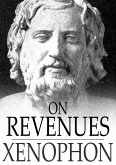In "On Revenues," Xenophon, the esteemed Athenian soldier, historian, and philosopher, presents a compelling examination of the economic and fiscal policies of his time. Written in a straightforward yet eloquent prose style, this treatise explores various methods for improving the revenue of the city-state of Athens. Engaging with themes of governance, public administration, and civic duty, Xenophon delves into practical solutions for enhancing public finance, reflecting the pragmatic spirit characteristic of his works. The dialogue format invites critical reasoning, encouraging readers to consider the implications of proposed economic reforms within the context of Athenian democracy. Xenophon, who lived from 430 to 354 BCE, was not only a contemporary of Socrates but also profoundly influenced by his philosophical inquiries into virtue and the state. His military experience and direct involvement in political debates uniquely positioned him to comment on economic matters, particularly in light of the struggles faced by Athens during and after the Peloponnesian War. This background offers a rich context for the insights within "On Revenues," as Xenophon blends practical observation with philosophical reflection, striving to encourage responsible leadership through sound fiscal policy. Readers interested in ancient economic thought, political philosophy, or the practical challenges of governance will find "On Revenues" an enlightening and relevant text. Xenophon'Äôs analytical approach provides timeless guidance on managing public resources effectively, making it an essential read for anyone seeking a deeper understanding of economic principles within the framework of civic responsibility.
Dieser Download kann aus rechtlichen Gründen nur mit Rechnungsadresse in A, B, BG, CY, CZ, D, DK, EW, E, FIN, F, GR, H, IRL, I, LT, L, LR, M, NL, PL, P, R, S, SLO, SK ausgeliefert werden.









